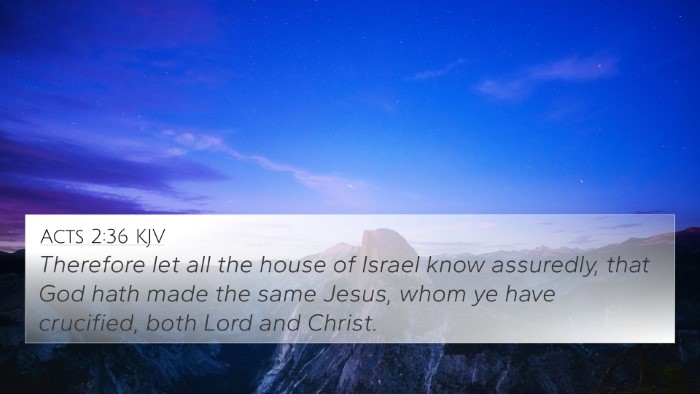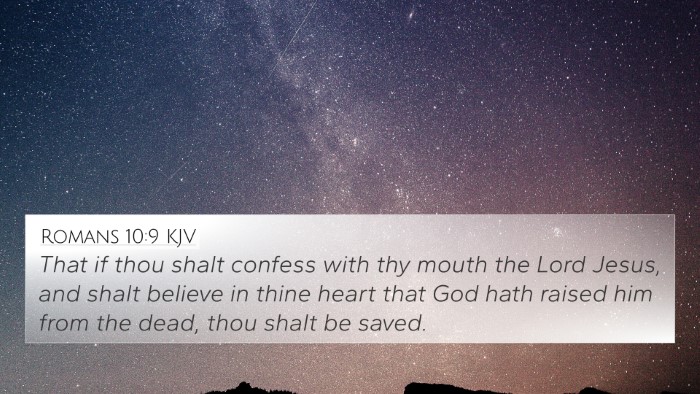This section features a detailed cross-reference designed to enrich your understanding of the Scriptures.
Below, you will find carefully selected verses that echo the themes and teachings related to Philippians 2:11 KJV. Click on any image to explore detailed analyses of related Bible verses and uncover deeper theological insights.
 1 John 4:15 (KJV) »
1 John 4:15 (KJV) »
Whosoever shall confess that Jesus is the Son of God, God dwelleth in him, and he in God.
 Romans 14:11 (KJV) »
Romans 14:11 (KJV) »
For it is written, As I live, saith the Lord, every knee shall bow to me, and every tongue shall confess to God.
 1 John 4:2 (KJV) »
1 John 4:2 (KJV) »
Hereby know ye the Spirit of God: Every spirit that confesseth that Jesus Christ is come in the flesh is of God:
 Romans 14:9 (KJV) »
Romans 14:9 (KJV) »
For to this end Christ both died, and rose, and revived, that he might be Lord both of the dead and living.
 Matthew 10:32 (KJV) »
Matthew 10:32 (KJV) »
Whosoever therefore shall confess me before men, him will I confess also before my Father which is in heaven.
 John 14:13 (KJV) »
John 14:13 (KJV) »
And whatsoever ye shall ask in my name, that will I do, that the Father may be glorified in the Son.
 1 Corinthians 8:6 (KJV) »
1 Corinthians 8:6 (KJV) »
But to us there is but one God, the Father, of whom are all things, and we in him; and one Lord Jesus Christ, by whom are all things, and we by him.
 1 Corinthians 12:3 (KJV) »
1 Corinthians 12:3 (KJV) »
Wherefore I give you to understand, that no man speaking by the Spirit of God calleth Jesus accursed: and that no man can say that Jesus is the Lord, but by the Holy Ghost.
 Revelation 3:5 (KJV) »
Revelation 3:5 (KJV) »
He that overcometh, the same shall be clothed in white raiment; and I will not blot out his name out of the book of life, but I will confess his name before my Father, and before his angels.
 1 Peter 1:21 (KJV) »
1 Peter 1:21 (KJV) »
Who by him do believe in God, that raised him up from the dead, and gave him glory; that your faith and hope might be in God.
 John 5:23 (KJV) »
John 5:23 (KJV) »
That all men should honour the Son, even as they honour the Father. He that honoureth not the Son honoureth not the Father which hath sent him.
 Acts 10:36 (KJV) »
Acts 10:36 (KJV) »
The word which God sent unto the children of Israel, preaching peace by Jesus Christ: (he is Lord of all:)
 Acts 2:36 (KJV) »
Acts 2:36 (KJV) »
Therefore let all the house of Israel know assuredly, that God hath made the same Jesus, whom ye have crucified, both Lord and Christ.
 Psalms 110:1 (KJV) »
Psalms 110:1 (KJV) »
The LORD said unto my Lord, Sit thou at my right hand, until I make thine enemies thy footstool.
 John 9:22 (KJV) »
John 9:22 (KJV) »
These words spake his parents, because they feared the Jews: for the Jews had agreed already, that if any man did confess that he was Christ, he should be put out of the synagogue.
 Romans 15:9 (KJV) »
Romans 15:9 (KJV) »
And that the Gentiles might glorify God for his mercy; as it is written, For this cause I will confess to thee among the Gentiles, and sing unto thy name.
 2 John 1:7 (KJV) »
2 John 1:7 (KJV) »
For many deceivers are entered into the world, who confess not that Jesus Christ is come in the flesh. This is a deceiver and an antichrist.
 Romans 10:9 (KJV) »
Romans 10:9 (KJV) »
That if thou shalt confess with thy mouth the Lord Jesus, and shalt believe in thine heart that God hath raised him from the dead, thou shalt be saved.
 John 12:42 (KJV) »
John 12:42 (KJV) »
Nevertheless among the chief rulers also many believed on him; but because of the Pharisees they did not confess him, lest they should be put out of the synagogue:
 John 13:31 (KJV) »
John 13:31 (KJV) »
Therefore, when he was gone out, Jesus said, Now is the Son of man glorified, and God is glorified in him.
 John 16:14 (KJV) »
John 16:14 (KJV) »
He shall glorify me: for he shall receive of mine, and shall shew it unto you.


























